Emotional & Social Intelligence
Emotional & Social Intelligence is essentially ‘the science of managing self and connecting with others’. It can be defined as the “Ability to adapt one’s behavior on the basis of awareness of one’s own emotions and attunement with others’ emotions”. This conceptualization of Socialigence can be pictorially represented as the following model:
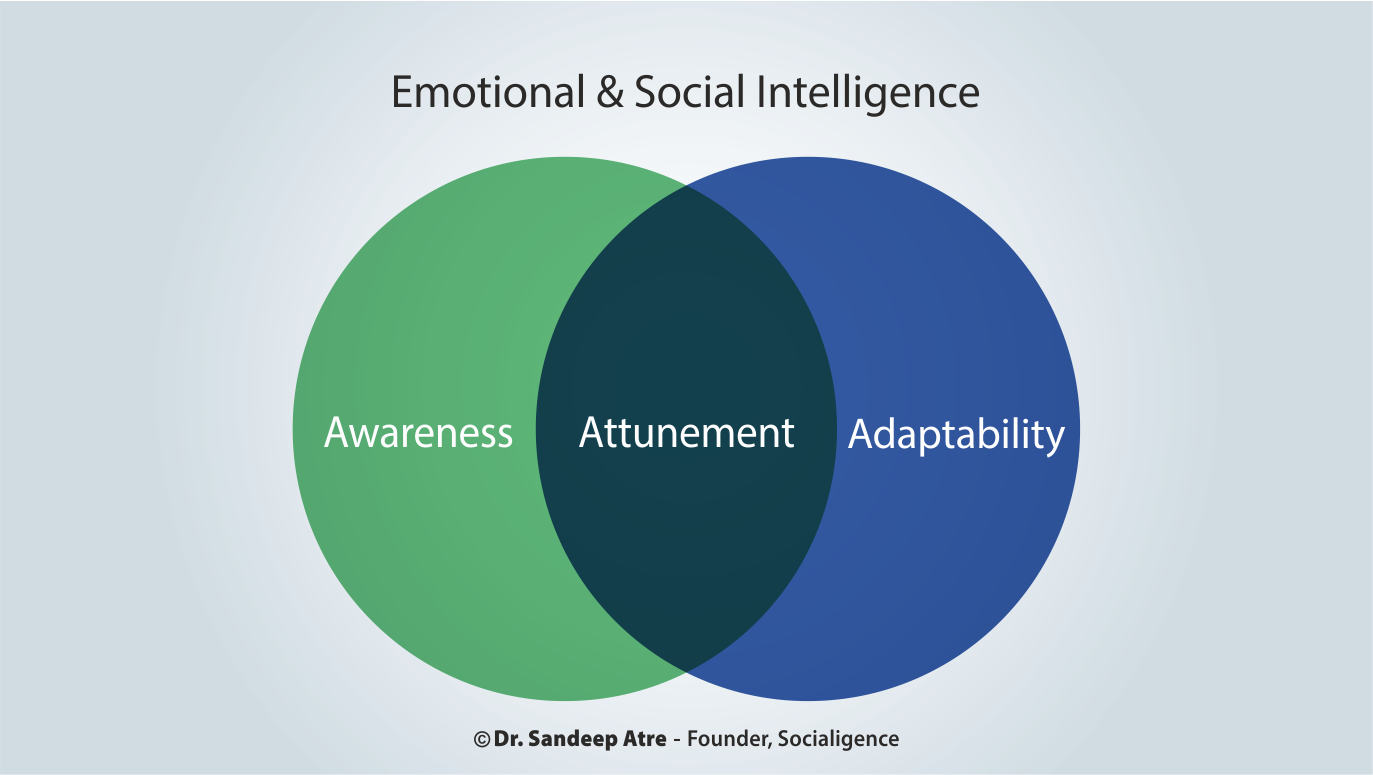
Thus, it is a combination of three components – Awareness, Attunement and Adaptability. Awareness is an understanding of what is going on inside oneself, Attunement is observing others and interpreting those observations for cognitive & emotional empathy. And Adaptability is utilizing awareness and attunement to choose the most constructive response in given conditions. According to us at Socialigence, awareness and attunement together are termed as emotional intelligence, and attunement and adaptability together are termed as social intelligence. And that is how together they form ‘Emotional & Social Intelligence’.
Note: Our online course on Emotional & Social Intelligence has separate specialized modules on awareness, attunement and adaptability; with video-based content customized specifically for India.
In its early days of introduction, The Harvard Business Review hailed emotional intelligence as one of the most influential business ideas that is “ground-breaking and paradigm-shattering”. And there was a good reason for it. Emotional & Social Intelligence (ESI) is the all-important base of all major intrapersonal and interpersonal ‘skills & concepts’.
ESI empowered ‘Intrapersonal skills & concepts’:
- Self-assessment
- Mindfulness
- Conscientiousness
- Self-confidence
- Willpower
- Self-motivation
- Stress-management
- Resilience
- Optimism
- Commitment
- Service-orientation
- Self-presentation
ESI empowered ‘Interpersonal skills & concepts’:
- Empathy
- Trustworthiness
- Cooperativeness
- Communication
- Managing relationships
- Counseling/Mentoring
- Influence
- Leadership
- Negotiation skills
- Conflict resolution
- Change management
- Political awareness
This makes Emotional & Social Intelligence immensely important in the domains of:
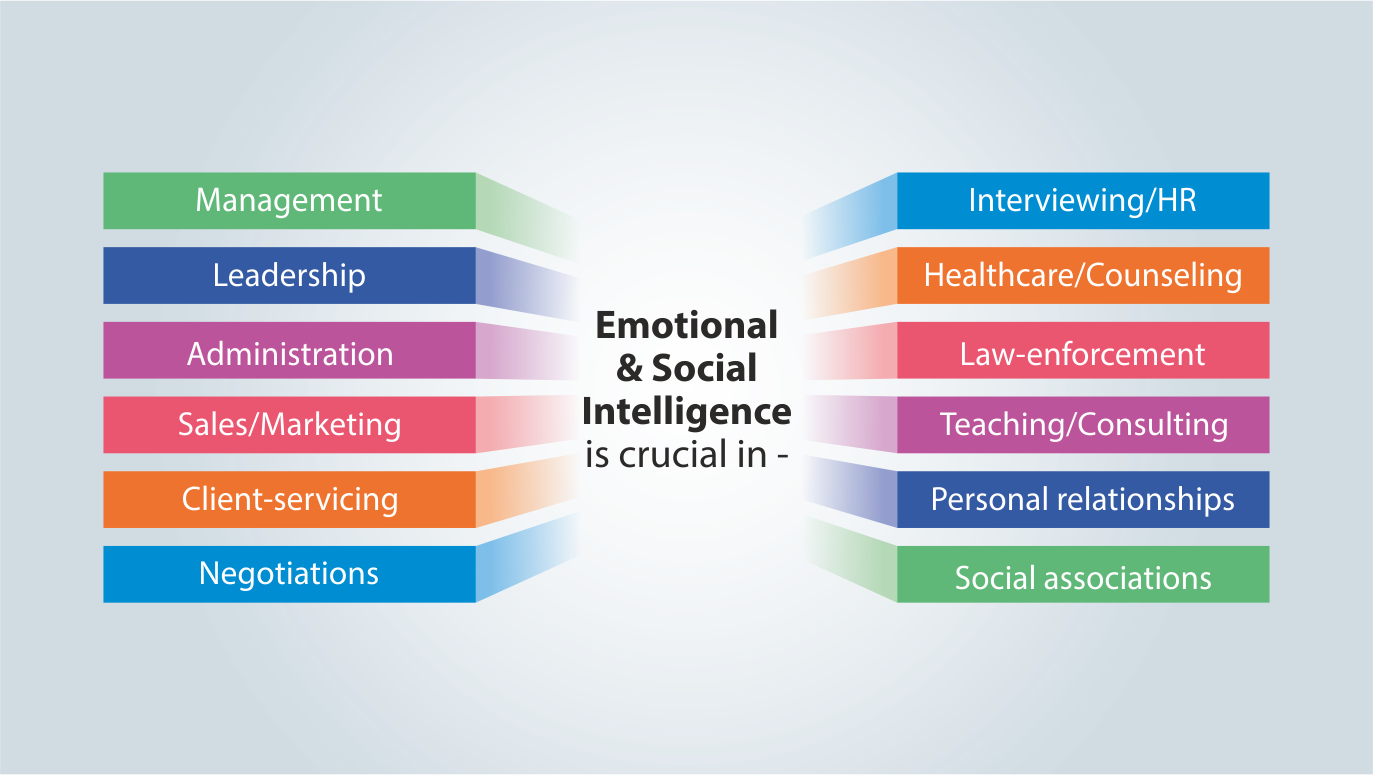
Moreover, in the list of ‘Future Work Skills – 2020’ by The Institute for the Future (IFTF) – an independent, nonprofit strategic research group with more than 40 years of forecasting experience –, Social intelligence features on the second slot. The list talks about what it will take to succeed and stay a ‘success’ in the workplace of tomorrow.
IFTF defines Social Intelligence as “Ability to connect to others in a deep and direct way, to sense and stimulate reactions and desired interactions” and further quotes “…It has always been a key skill for workers who need to collaborate and build relationships of trust, but it is even more important as we are called on to collaborate with larger groups of people in different settings. Our emotionality and social IQ developed over millennia of living in groups will continue be one of the vital assets that give human workers a comparative advantage over machines”. So, we can see that Emotional & Social Intelligence ‘is’ and ‘will continue to be’ important for the success at workplace.
Note: Our online course on Emotional & Social Intelligence is oriented towards professional effectiveness through its video-based content developed around workplace-scenarios in India.
Fulfillment on personal front is not only important for professional success but is also the eventual goal we are pursuing through professional success. Numerous studies related to love, marriage, parenting, and family-relations have consistently shown that across the world, personal and social relationships are based on that all-important ‘emotional connect’. And the absence of that costs us dearly. For instance:
- The study on ‘Well-being of Children’ by UNICEF found that “…family relationships are the single most important contributor to children’s subjective well-being”. And ‘ease in talking to parents’ was an important aspect of it.
- Every year, world organizations such as the UN record global divorce rates and the underlying causes. The cause that has consistently ranked as the ‘biggest cause’ is
“Incompatibility/Growing apart”. - According to WHO, depression is now the leading cause of disability worldwide. It found that major reason of mental-health problems is lack of ‘emotional & social connect’, and psychosocial treatments are still the preferred ones.
Yes, at the end of the day, it is as much about ‘quality of life’ as about ‘standard of living’. And Emotional & Social Intelligence plays an equally important role in attaining fulfillment in personal and social life by ensuring that all-important ‘emotional connect’.
ESI has been found to be immensely helpful in development of:
- Empathy
- Maturity
- Conversational effectiveness
- Listening skills
- Trustworthiness
- Kindness
- Mindfulness
- Patience
This makes Emotional & Social Intelligence immensely important in:
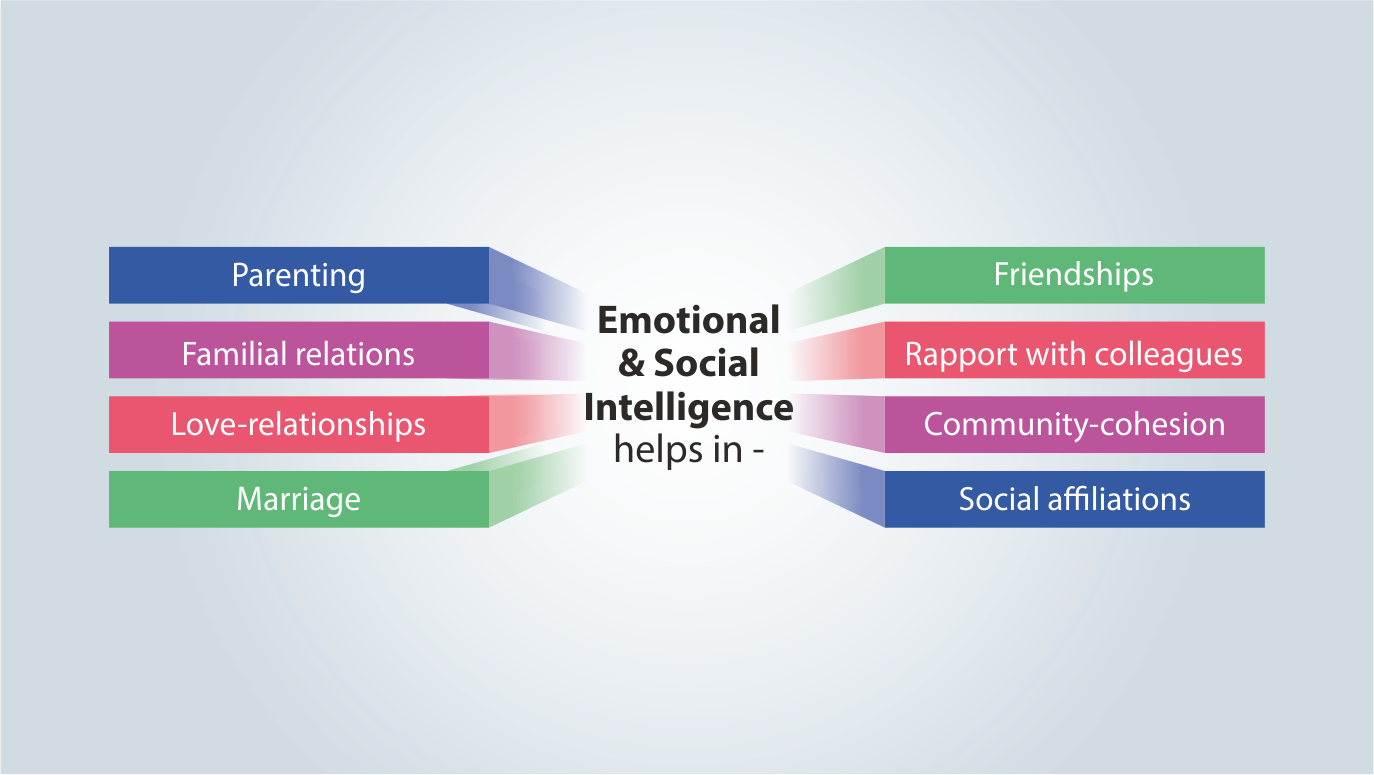
Note: Our online course on Emotional & Social Intelligence has video-based content on mindfulness & empathy for everyday situations in personal & social relationships.
As discussed, Emotional & Social Intelligence is essentially ‘the science of managing self and connecting with others’. This science borrows concepts and practices majorly from domains of:
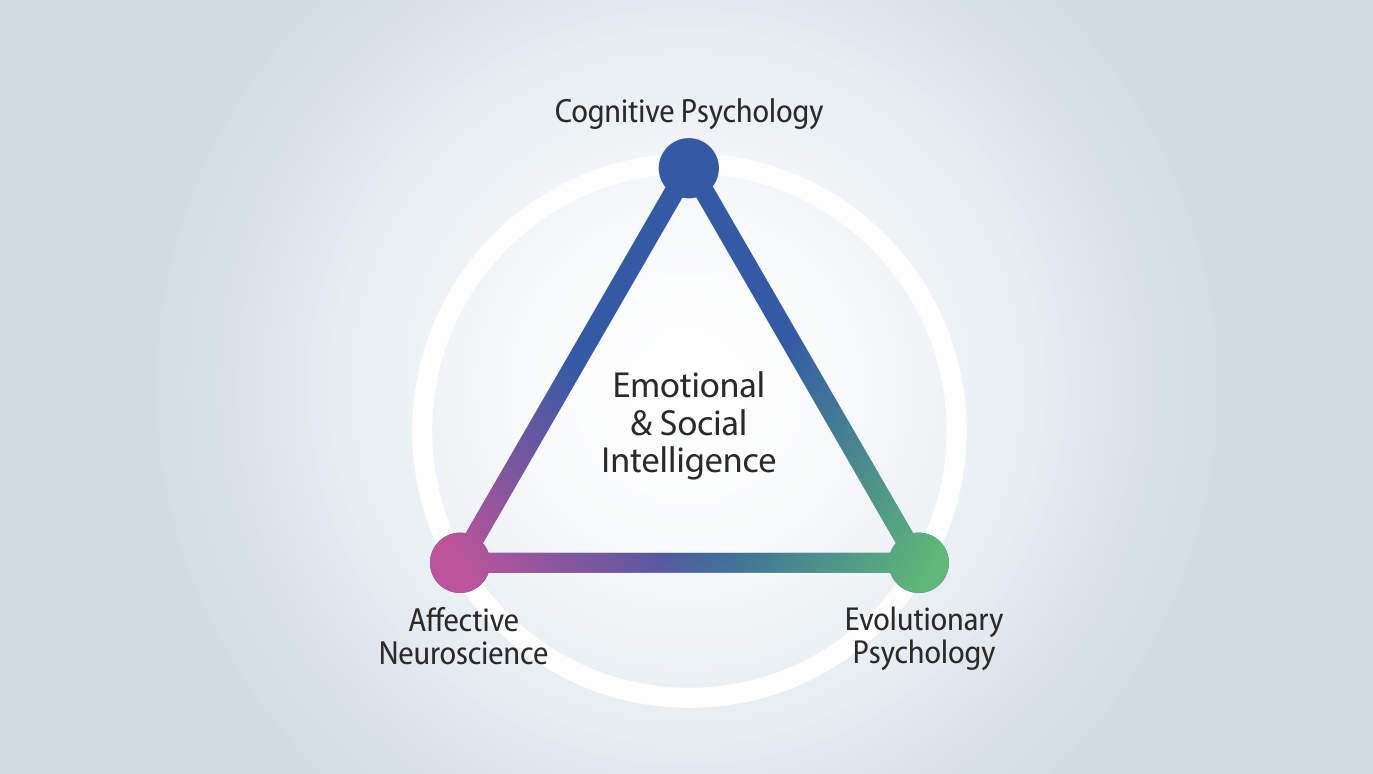
- Cognitive psychology – the study of how people receive, process, store and retrieve information. It studies various mental processes like language, memory and problem-solving.
- Affective neuroscience – the study of how brain-networks and associated neurotransmitters (chemicals) are involved in emotions and behavior.
- Evolutionary psychology – the study of human behavior in the light of effects of evolution by combining psychology with biology.
Though these terms look and sound complex, the fact is that with some initiation, ensuing demystification helps one appreciate how these logical pieces of the puzzle of human-behavior come together to help you learn the applicable skill of ‘Emotional & Social Intelligence’.
Note: Our online course on Emotional & Social Intelligence simplifies the scientific concepts in relatable and applicable way, with content & language customized for India.
As we discussed, Emotional & Social Intelligence is the “Ability to adapt one’s behavior on the basis of awareness of one’s own emotions and attunement with others’ emotions”. Thus, it can be seen as a combination of three components – Awareness, Attunement and Adaptability.
Some people may call them qualities, some competencies, and probably some will call them traits. However, we would like to call them skills, because these three skills pertaining to Emotional & Social Intelligence can be learnt, practiced and mastered.
At Socialigence, through our online video-based course, we ensure the development of Emotional & Social Intelligence through four specialized modules:
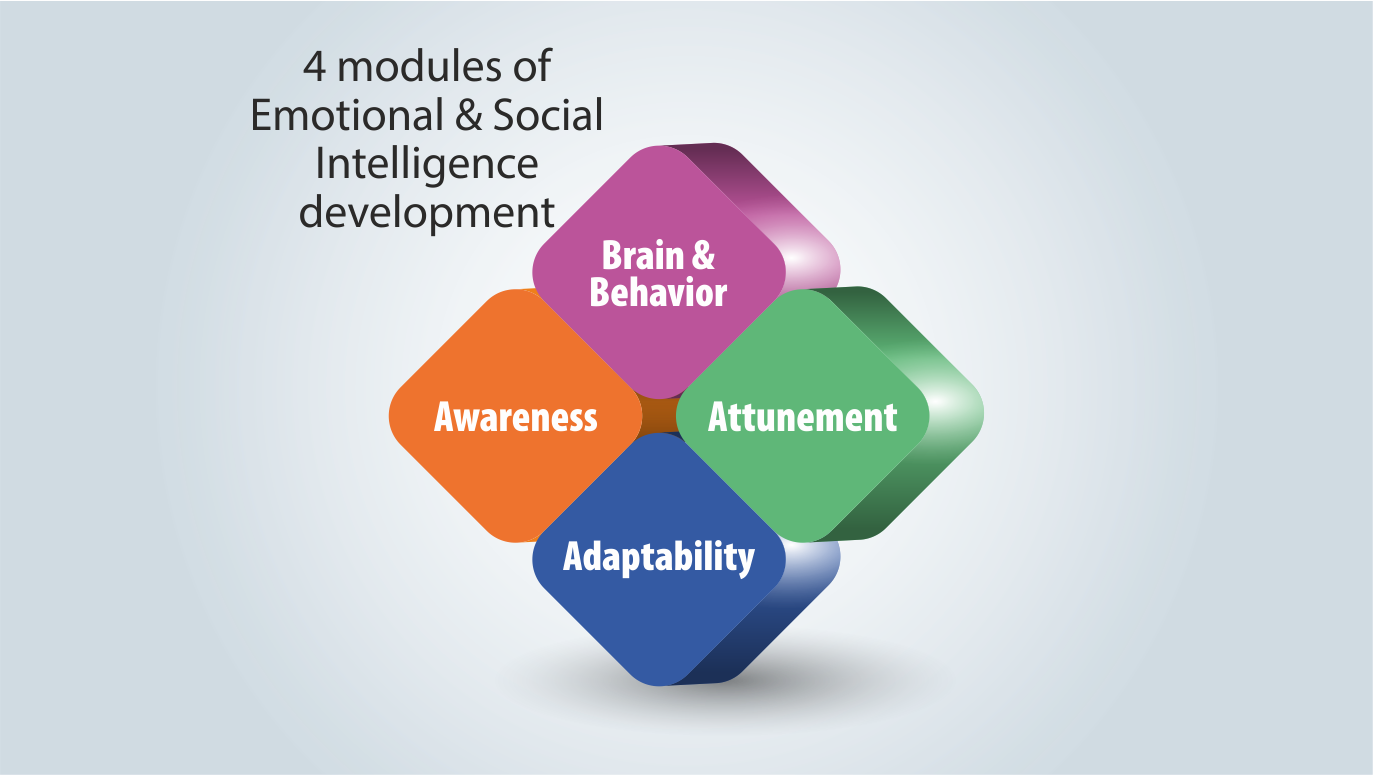
- Brain & Behavior: A module covering the basics of ‘design & structure’ of brain, thinking mechanism, working of memory system, key-parts of brain, and important neurotransmitters; with special focus on relevance in terms of human behavior.
- Awareness: A module covering the functioning of ANS (Autonomic Nervous System), recognizing & identifying emotions, spotting the roots of emotions, understanding emotional profile, and learning the effects of emotional contagion.
- Attunement: A module covering the detailed knowledge of interpreting the nonverbal behavior – expressions, gestures, postures, vocal cues and personal environment – for understanding someone’s emotions; with special focus on empathy.
- Adaptability: A module covering application of the concepts of ‘brain & behavior’, awareness and attunement for learning to respond with ESI; with special focus on workplace-scenarios. It is followed by a ‘Test for Certification’.
Thus, through an iterative yet progressive approach of concept-building, application, and analysis, Emotional & Social Intelligence can definitely be developed.
Note: Our online course on Emotional & Social Intelligence has high-quality brain-animation, videos on real-life situations and analysis of everyday scenarios for result-oriented training.
Emotional & Social Intelligence is an applicable skill and has proven tangible-benefits. It achieves those benefits by fostering the development of those ‘intrapersonal & interpersonal’ competencies that have a direct connection to deliverables in profession.
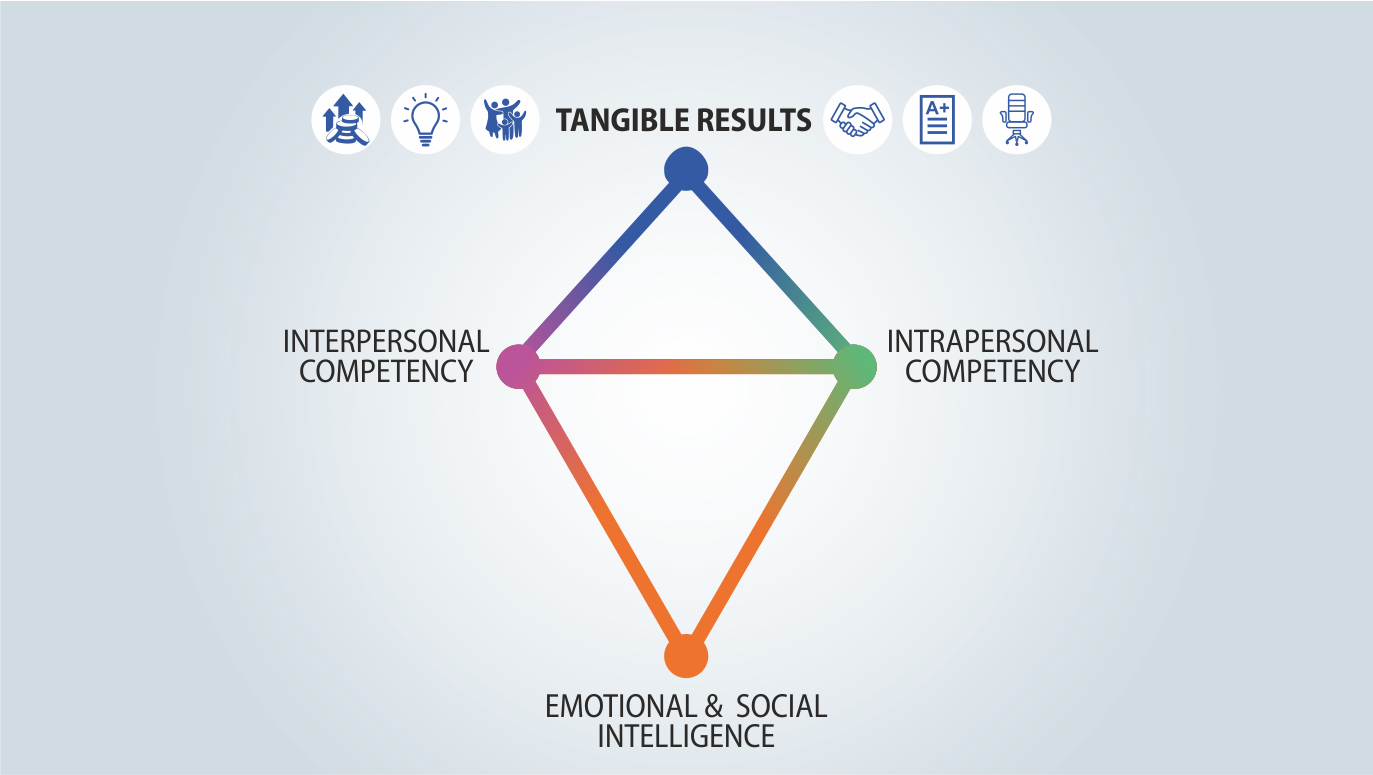
Some of the documented instances are:
- When average-performing group of managers at one of Siemen’s global division were trained on ESI (Emotional & Social Intelligence) competencies, they added an additional $ 1.5 million in profit, double that of a comparison group which had no training.
- For next-generation leadership-development, Johnson & Johnson looked at its 358 midcareer executives across the globe. The group reflected a global spread, with 45% women in it. They identified about a half of this group as ‘high potentials’. When all of these 358 were evaluated on various competencies, the high-potentials were found to exhibit all 20 of the ESI (Emotional & Social Intelligence) competencies while the executives in the comparison group possessed only a few of them.
- Researcher Lyle Spencer studied managers of a $2 billion global division of Siemens with 400 branches in 56 countries. When he compared the competencies of the star performers and average performers (Star performers were the Top 10% performers with average annual sales of $29.8 million against $17 million annual sales of average performers), he found that the differentiators were the four competencies of ESI (Emotional and Social Intelligence) and not a single technical or cognitive competency.
- Researchers Goleman, Boyatzis & McKee analyzed years’ data of from close to 500 competence models from global companies including the likes of IBM, Lucent, PepsiCo, British Airways, and academic institutions and government agencies. To determine which capabilities drove outstanding performance in these organizations, they grouped capabilities into 3 categories: 1) Technical 2) Cognitive 3) ESI (Emotional & Social Intelligence). After analyzing all the data, they found that ESI-based competencies played an increasingly important role at higher levels of organizations, where differences in technical skills are of negligible importance. Moreover, about 85% of the difference of star-performers’ profiles from average-performers was attributable to ESI-related factors
- In a survey conducted by the Institute of Mindful Leadership, 93% of leaders reported that the training helped them create space for innovation, and nearly 70% said it helped them to think strategically (Institute for Mindful Leadership Survey).
- In meta-analysis of 668 evaluation studies of SEL (Social & Emotional Learning) programs for children from preschoolers through high school by Roger Weissberg, it was found that SEL programs produced a strong benefit in academic accomplishment.
- In participating schools of SEL training, up to 50 percent of children showed improved achievement scores and up to 38 percent improved their grade-point averages.
- SEL programs also made schools safer: incidents of misbehavior dropped by an average of 28 percent; suspensions by 44 percent; and other disciplinary actions by 27 percent.
- After SEL programs, attendance rates rose, while 63 percent of students demonstrated significantly more positive behavior.
- As a result, in 2002, UNESCO began a worldwide initiative to promote Social and Emotional Intelligence, sending a statement of ten basic principles for implementing SEI to the ministries of education in 140 countries.
- The Rutgers University-based Consortium for Research on Emotional Intelligence in Organizations (CREIO), founded in 1996, has been successfully collaborating with organizations to develop SEI competencies.
- A study (Hulsheger et al., 2012) found that two weeks of Mindfulness & SEI training increased well-being, decreased emotional exhaustion at work, and even increased job satisfaction.
- Mindfulness & SEI has been found to increase brain cortex thickness and activation in regions associated with emotional awareness and emotion management (Tang et al., 2015)
- Training in the emotional intelligence skill of compassion has been shown to reduce interpersonal stress and improve relationships (Singer 2016; Kok et al. 2013).
- In a study of 32 stores in a US retail chain, researchers George & Bettenhausen found that outlets with positive salespeople showed the best sales results. And more importantly, it was found that it was the store manager who created the emotional climate that drove salespeople’s moods.
- In a study of 62 CEOs from ‘Fortune-500 & leading companies’, researchers Barsade & Ward found that lesser their ‘personality-clashes, conflicts and friction’ with their top management teams, better the company’s business results.
- A study of CEOs of health services companies by Eric Harter found that self-awareness of leadership abilities was greatest for CEOs of the best-performing companies and poorest for CEOs of the worst performers.
- At Weatherhead School of Management at Case Western Reserve University, MBA students were asked to assess their ESI competencies, choose which competencies they wish to strengthen, and be guided by and individualized learning plan for the same. The gains lasted for years for them. Up to two years after MBA, they still showed 47% improvement on self-awareness competencies and 75% for competencies such as empathy and team leadership.
- Researcher Lyle Spencer found that for every 1 percent improvement in the service climate, there’s a 2 percent increase in company’s revenue.
- Researchers Boyatzis, Goleman & Rhee did an analysis of the partners’ contributions to the profits of a large accounting firm. If the partner had strengths in self-management, he or she added 78% more incremental profit than did partners without those strengths. Likewise, the added profits for partners with strengths in social skills were 110% greater, and those with strengths in the self-management added a 390% incremental profit – in this case, $1,465,000 more per year. By contrast, significant strengths in analytical reasoning abilities added just 50% more profit. Thus purely cognitive abilities help, but the ESI competencies help far more.
Note: Our result-oriented online course on Emotional & Social Intelligence is based on extensive research in psychology & neuroscience, and is India-centric in its content & language.
